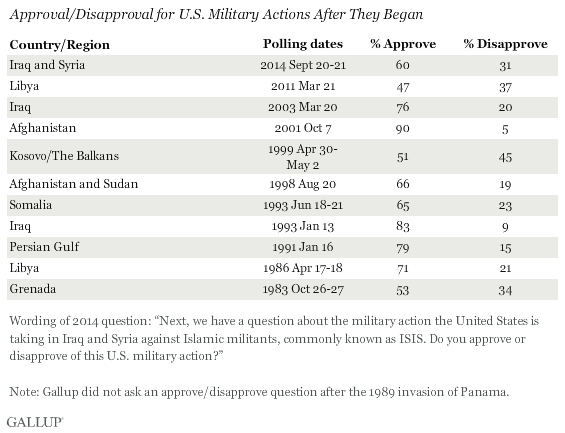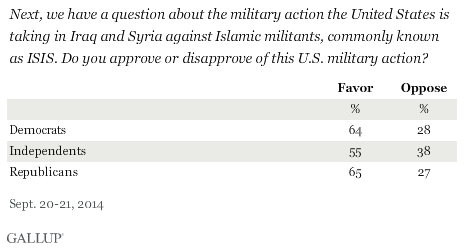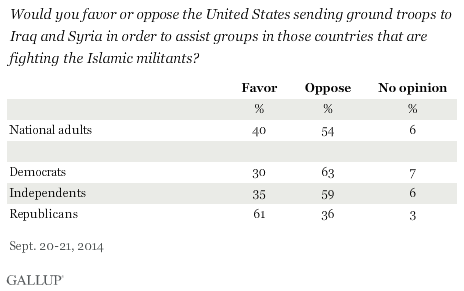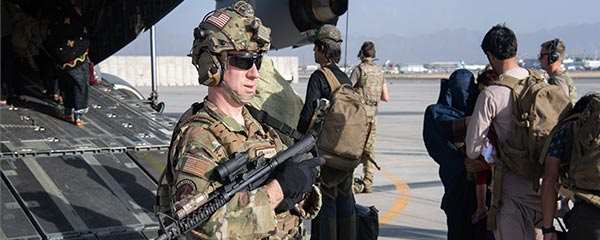PRINCETON, NJ -- Americans' 60% approval for U.S. military action against Islamic militants in Iraq and Syria, commonly known as ISIS, is slightly below their average 68% approval for 10 other U.S. military operations Gallup has asked about using this question format. Americans have been a bit less supportive of recent military actions after prolonged engagements in Afghanistan and Iraq.

The most recent results are based on a Sept. 20-21 Gallup poll, conducted after the U.S. had launched airstrikes in Iraq but before military action began in Syria on Sept. 22. President Barack Obama announced his intention in a nationally televised address on Sept. 10 to use U.S. military force to "degrade and destroy" ISIS, also known as ISIL, in those two countries.
Notably, there is little partisan difference in opinions of the U.S. military action, with 64% of Democrats and 65% of Republicans approving. Independents are somewhat less likely to approve, but a majority (55%) still do.

Now that military action is already under way, Americans' support for it is significantly higher than in June when Gallup asked about proposed U.S. military actions to "aid the Iraqi government in fighting militants there." At that time, after ISIS gained control of parts of Iraq, 39% of Americans were in favor of direct U.S. military action in Iraq and 54% opposed.
This increase is not atypical, as support commonly increases from the time military action is first discussed as an option until it is taken. For example, 23% of Americans favored U.S. military action to drive the Iraqis out of Kuwait in August 1990. By January 1991, just before the U.S. began the Persian Gulf War, 55% were in favor. Immediately after the U.S. began the war, 79% approved of it.
The increase in support is likely also tied to ISIS being perceived as a more direct threat to the U.S., which may not have been as clear in June. In recent weeks, ISIS has captured and beheaded two U.S. journalists. In fact, the current poll finds 50% of Americans describing ISIS as a "critical threat" to U.S. vital interests, with an additional 31% saying the group is an "important threat."
About one in three Americans (34%) say they are following the news about the Islamic militants' actions in Iraq and Syria "very closely," while 41% say they are following it "somewhat closely." Approval of the U.S. military action is significantly higher among those following it very or somewhat closely.
Americans Not Backing U.S. Ground Troops to Fight ISIS
Despite their overall approval of U.S. military action in Iraq and Syria, more Americans oppose (54%) than favor (40%) sending U.S. ground troops there. The relatively low level of support for ground troops could be related to Americans' reluctance to engage in another extended fight in Iraq. A majority of Americans continue to describe the 2003 Iraq War as a mistake for the U.S. And, as of June, a majority still backed President Obama's decision to withdraw all U.S. troops from Iraq.

Although Republicans and Democrats both approve of the current U.S. military action, Republicans are twice as likely as Democrats to favor the use of ground troops, 61% to 30%. Independents' views are in line with those of Democrats, at 35% approval. Democrats may be taking their cue from President Obama, who is ruling out the use of U.S. ground troops. Republicans, on the other hand, may be more sympathetic to the idea of ground troops in Iraq because the 2003 Iraq War was initiated by a Republican president.
Bottom Line
Americans' level of support for the current military action against Islamic militants in Iraq and Syria is below the historical average for support for other U.S. military interventions over the past 31 years, but still represents a majority of Americans. This marks a rare instance in which Republicans and Democrats share basically the same attitudes. However, partisanship comes back into play on the issue of potentially using ground troops in Iraq and Syria, which Republicans support and Democrats do not.
Survey Methods
Results for this Gallup poll are based on telephone interviews conducted Sept. 20-21, 2014, on the Gallup Daily tracking survey, with a random sample of 1,013 adults, aged 18 and older, living in all 50 U.S. states and the District of Columbia.
For results based on the total sample of national adults, the margin of sampling error is ±4 percentage points at the 95% confidence level.
Interviews are conducted with respondents on landline telephones and cellular phones, with interviews conducted in Spanish for respondents who are primarily Spanish-speaking. Each sample of national adults includes a minimum quota of 50% cellphone respondents and 50% landline respondents, with additional minimum quotas by time zone within region. Landline and cellular telephone numbers are selected using random-digit-dial methods. Landline respondents are chosen at random within each household on the basis of which member had the most recent birthday.
Samples are weighted to correct for unequal selection probability, nonresponse, and double coverage of landline and cell users in the two sampling frames. They are also weighted to match the national demographics of gender, age, race, Hispanic ethnicity, education, region, population density, and phone status (cellphone only/landline only/both, and cellphone mostly). Demographic weighting targets are based on the most recent Current Population Survey figures for the aged 18 and older U.S. population. Phone status targets are based on the most recent National Health Interview Survey. Population density targets are based on the most recent U.S. census. All reported margins of sampling error include the computed design effects for weighting.
In addition to sampling error, question wording and practical difficulties in conducting surveys can introduce error or bias into the findings of public opinion polls.
View survey methodology, complete question responses, and trends.
For more details on Gallup's polling methodology, visit www.gallup.com.
